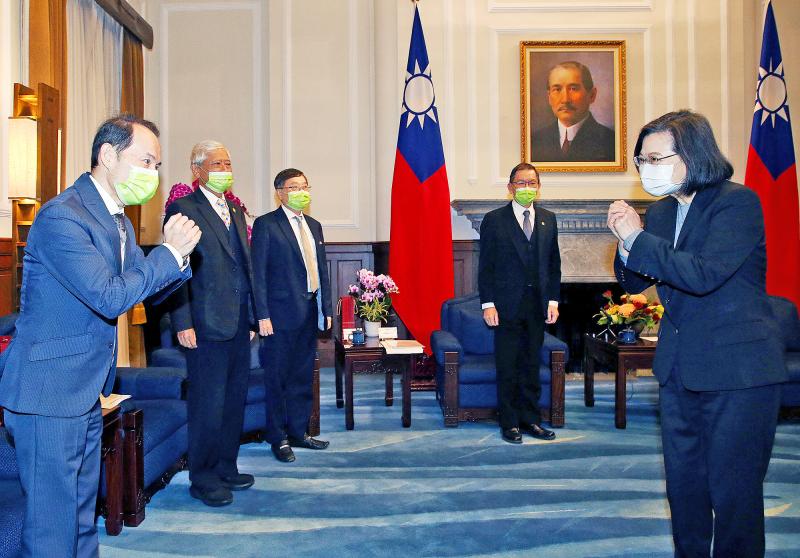Efforts must be made to better secure Taiwan’s place in the global supply chain by localizing production of equipment and facilities used by the semiconductor industry, President Tsai Ing-wen (蔡英文) said yesterday.
Tsai discussed the issue during a meeting with representatives from the Taiwan Electronic Equipment Industry Association at the Presidential Office in Taipei.
Product shortages throughout the COVID-19 pandemic — particularly of automotive chips — highlighted the pivotal role of Taiwan in the global supply chain, she said.

Photo: CNA
Tsai thanked the association for cooperating with the government on the shared goal of localizing production of important semiconductor industry equipment.
Many Taiwanese manufacturers of such equipment are small and medium enterprises, which often encounter resource shortages, she said, adding that the government would provide manufacturers with resource assistance and encourage more businesses to manufacture the needed equipment.
Taiwan’s semiconductor industry output in 2020 was valued at NT$90.7 billion (US$3.29 billion), which last year grew 28.7 percent to NT$116.7 billion, she said.
It was the product of a collaboration between the association, businesses and the government, she said.
The domestic chip industry last year invested NT$1 trillion in semiconductor fabs, with chip manufacturing equipment accounting for 70 percent of the costs, she said.
The majority of that equipment — or about NT$600 billion of the investment — were purchased from overseas, she said.
“That shows there is a large area for growth in the domestic industry. We must improve efforts to make that equipment locally,” she said.
“The association has also been pushing for Taiwanese companies to make manufacturing equipment for the international market, and there has been important progress in that area,” she added.
Citing an example, Tsai said that Taiwanese companies have signed memorandums of understanding with businesses in Japan’s Oita and Kumamoto prefectures.
Tsai said that she hoped Taiwan could become an advanced semiconductor manufacturing center.
Among key strategies are to push for local manufacturing of commercial equipment and advanced packaging equipment, she said.
“It is our hope that through continued cooperation between government and industry, we can make Taiwan’s electronic equipment industry more internationally competitive,” she said.

A preclearance service to facilitate entry for people traveling to select airports in Japan would be available from Thursday next week to Feb. 25 at Taiwan Taoyuan International Airport, Taoyuan International Airport Corp (TIAC) said on Tuesday. The service was first made available to Taiwanese travelers throughout the winter vacation of 2024 and during the Lunar New Year holiday. In addition to flights to the Japanese cities of Hakodate, Asahikawa, Akita, Sendai, Niigata, Okayama, Takamatsu, Kumamoto and Kagoshima, the service would be available to travelers to Kobe and Oita. The service can be accessed by passengers of 15 flight routes operated by

MORE FALL: An investigation into one of Xi’s key cronies, part of a broader ‘anti-corruption’ drive, indicates that he might have a deep distrust in the military, an expert said China’s latest military purge underscores systemic risks in its shift from collective leadership to sole rule under Chinese President Xi Jinping (習近平), and could disrupt its chain of command and military capabilities, a national security official said yesterday. If decisionmaking within the Chinese Communist Party has become “irrational” under one-man rule, the Taiwan Strait and the regional situation must be approached with extreme caution, given unforeseen risks, they added. The anonymous official made the remarks as China’s Central Military Commission Vice Chairman Zhang Youxia (張又俠) and Joint Staff Department Chief of Staff Liu Zhenli (劉振立) were reportedly being investigated for suspected “serious

ENHANCING EFFICIENCY: The apron can accommodate 16 airplanes overnight at Taoyuan airport while work on the third runway continues, the transport minister said A new temporary overnight parking apron at Taiwan Taoyuan International Airport is to start operating on Friday next week to boost operational efficiency while the third runway is being constructed, the Ministry of Transportation and Communications said yesterday. The apron — one of the crucial projects in the construction of the third runway — can accommodate 16 aircraft overnight at the nation’s largest international airport, Minister of Transportation and Communications Chen Shih-kai (陳世凱) told reporters while inspecting the new facility yesterday morning. Aside from providing the airport operator with greater flexibility in aircraft parking during the third runway construction,

Taiwanese and US defense groups are collaborating to introduce deployable, semi-autonomous manufacturing systems for drones and components in a boost to the nation’s supply chain resilience. Taiwan’s G-Tech Optroelectronics Corp subsidiary GTOC and the US’ Aerkomm Inc on Friday announced an agreement with fellow US-based Firestorm Lab to adopt the latter’s xCell, a technology featuring 3D printers fitted in 6.1m container units. The systems enable aerial platforms and parts to be produced in high volumes from dispersed nodes capable of rapid redeployment, to minimize the risk of enemy strikes and to meet field requirements, they said. Firestorm chief technology officer Ian Muceus said